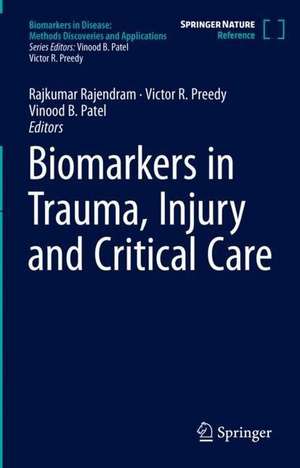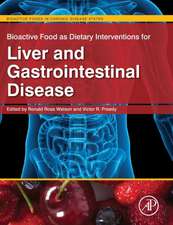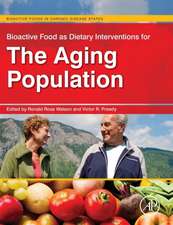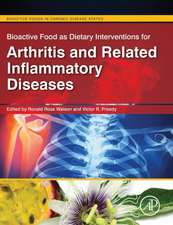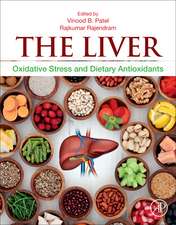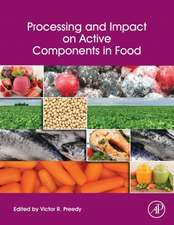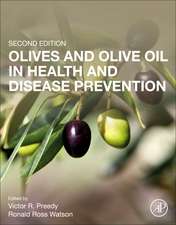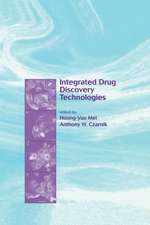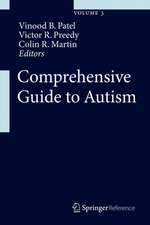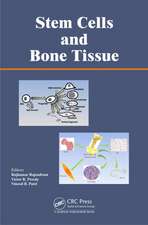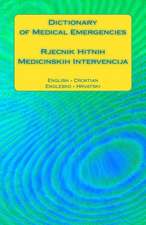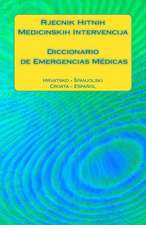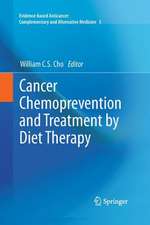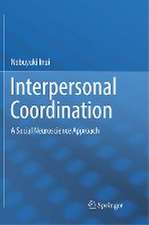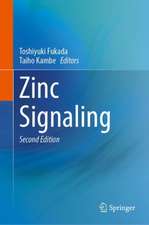Biomarkers in Trauma, Injury and Critical Care: Biomarkers in Disease: Methods, Discoveries and Applications
Editat de Rajkumar Rajendram, Victor R. Preedy, Vinood B. Patelen Limba Engleză Hardback – 23 mar 2023
Biomarkers and methods used in critical care and critically ill patients are discussed, as well as biomarkers in trauma and special conditions. Specific biomarker components are explained and models for modeling trauma in research are presented.
This systematic handbook is an excellent resource for researchers and specialists in trauma research and treatment, as well as clinicians and physicians who want a thorough overview of various injuries, trauma, and their detection methods.
Preț: 3983.88 lei
Preț vechi: 4193.55 lei
-5% Nou
Puncte Express: 5976
Preț estimativ în valută:
762.28€ • 795.97$ • 629.49£
762.28€ • 795.97$ • 629.49£
Carte tipărită la comandă
Livrare economică 11-17 aprilie
Preluare comenzi: 021 569.72.76
Specificații
ISBN-13: 9783031073946
ISBN-10: 3031073940
Pagini: 1212
Ilustrații: XXVII, 1212 p. 132 illus., 112 illus. in color. In 2 volumes, not available separately.
Dimensiuni: 155 x 235 mm
Greutate: 2.7 kg
Ediția:1st ed. 2023
Editura: Springer International Publishing
Colecția Springer
Seria Biomarkers in Disease: Methods, Discoveries and Applications
Locul publicării:Cham, Switzerland
ISBN-10: 3031073940
Pagini: 1212
Ilustrații: XXVII, 1212 p. 132 illus., 112 illus. in color. In 2 volumes, not available separately.
Dimensiuni: 155 x 235 mm
Greutate: 2.7 kg
Ediția:1st ed. 2023
Editura: Springer International Publishing
Colecția Springer
Seria Biomarkers in Disease: Methods, Discoveries and Applications
Locul publicării:Cham, Switzerland
Cuprins
Biomarkers and outcomes: the example of traumatic brain injury.- Biomarkers in neurological injury: fibrinogen and beyond.- Biomarkers for liver injury: micro RNAS and beyond.- Biomarkers in muscle injury: proteomic and beyond.- Biomarkers in lung injury:.- Biomarkers and penetrating thoracic trauma.- Biomarkers in renal injury.- Biomarkers of heart muscle damage and injury: mRNA expression and beyond.- Biomarkers of burn severity.- Biomarkers and prognosis in sepsis: muscle mass and beyond.- Biomarkers of acute inflammation in polytrauma.- Electrolytes in critical care as a biomarker.- Critical care and 5'-Aminolevulinate synthase 2 (ALAS2) expression as a biomarker.- miRNAs as biomarkers of critically Ill patients.- C-Reactive protein and implications to the Neonatal Intensive Care Unit.- 129Xe magnetic resonance imaging (MRI) as a biomarker and implications for critical care.- Gas imaging of aeration and fractional ventilation as a biomarker in critical care.- Circulating PD-1/2B4 CD8+ T-cells patterns as biomarkers and the ICU.- Collagen and fibrotic biomarkers in critical care.- Biomarker mortality prediction model for sepsis in critical care: parsimonious modelling and beyond.- Acute kidney injury in critical care and biomarkers.- Platelet Function Assays in trauma.- Coagulation tests and fibrinogen concentrate in trauma.- Biomarkers and the time window-in trauma patients.- Inflammatory biomarkers in animal model of brain Injury.
Notă biografică
Dr Rajkumar Rajendram AKC BSc (Hons) MBBS (Dist) MRCP (UK) EDIC FRCP Edin FRCP Lon CCT Internal Medicine (Acute), Anaesthesia and Intensive Care is a clinician scientist who has a focus on anaesthesia, intensive care and peri-operative medicine. Dr Rajendram graduated in 2001 with a distinction from Guy’s, King’s and St. Thomas Medical School, in London. As an undergraduate he was awarded several prizes, merits and distinctions in pre-clinical and clinical subjects.
Dr Rajendram began his post-graduate medical training in general medicine and intensive care in Oxford. He attained membership of the Royal College of Physicians (MRCP) in 2004 and completed specialist training in acute and general medicine in Oxford in 2010. Dr Rajendram also trained in anaesthesia and intensive care in London. During this training he obtained extensive experience in the management of trauma, toxicology and sepsis at the internationally renowned major trauma centres of the Royal London Hospital and the Oxford University Hospitals. He was awarded fellowship of the Royal College of Anaesthetists (FRCA) in 2009 and fellowship of the Faculty of Intensive Care Medicine (FFICM) in 2013. He was awarded the European diploma of intensive care medicine (EDIC) and completed specialist training in anaesthesia and intensive care in 2014. In 2017 he became a fellow of the Royal College of Physicians (FRCP), Edinburgh and then became a FRCP, London in 2019.
Dr Rajendram returned to Oxford as a Consultant in the Department of Acute General Medicine at the John Radcliffe Hospital, Oxford. The UK National Spinal Cord Injury Centre is based at Stoke Mandeville Hospital, Aylesbury where Dr Rajendram subsequently thrived as a Consultant in the Department of Anaesthesia and Intensive Care. He is currently a Consultant in the Department of Medicine at King Abdulaziz Medical City, National Guard Heath Affairs, Riyadh, Saudi Arabia. This is theleading major trauma centre in Saudi Arabia. To improve the outcomes of victims of major trauma, Dr Rajendram recently developed a novel medical-surgical co-management service (i.e. peri-operative medicine) for this complex cohort that is at high risk of morbidity and mortality.
As a clinician scientist Dr Rajendram has also devoted significant time and effort into research and education. He is a joint appointment Assistant Professor in the College of Medicine, King Saud bin Abdulaziz University for Health Sciences, Riyadh, Saudi Arabia and has published over 300 textbook chapters, review articles, peer-reviewed papers and abstracts many of which are related to the pathogenesis, investigation and treatment of disease which includes critical care, and trauma. He is lead Editor on the books Diet and Nutrition in Critical Care, the Neuroscience of Traumatic Brain Injury and the Neuroscience of Spinal Cord Injury.
Victor R. Preedy BSc, PhD, DSc, FRSB, FRSPH, FRC Path, FRSC is Professor of Clinical Biochemistry and Pathology at King’s College Hospital, Emeritus Professor of Nutritional Biochemistry at King’s College London and Visiting Professor at the University of Hull, Professor Preedy graduated in 1974 with an Honours Degree in Biology and Physiology with Pharmacology. He gained his University of London PhD in 1981. In 1992, he received his Membership of the Royal College of Pathologists and in 1993 he gained his second doctoral degree, for his outstanding contribution to protein metabolism in health and disease. Professor Preedy was elected as a Fellow to the Institute of Biology in 1995 and to the Royal College of Pathologists in 2000. Since then, he has been elected as a Fellow to the Royal Society for the Promotion of Health (2004) and The Royal Institute of Public Health (2004). In 2009, Professor Preedy became a Fellow of the Royal Society for Public Health and in2012 a Fellow of the Royal Society of Chemistry. In his career Professor Preedy has carried out research at the Cardiothoracic Institute, National Heart Hospital (part of Imperial College London), The School of Pharmacy (now Part of University College London) and the MRC Centre at Northwick Park Hospital. He has collaborated with research groups in Finland, Japan, Australia, USA and Germany. He is a leading expert on the science of health and has a long-standing interest in biomarkers, especially related to tissue pathology. He has lectured nationally and internationally. To his credit, Professor Preedy has published over 750 articles, which includes peer-reviewed manuscripts based on original research, abstracts and symposium presentations, reviews and numerous books and volumes.
Dr Rajendram began his post-graduate medical training in general medicine and intensive care in Oxford. He attained membership of the Royal College of Physicians (MRCP) in 2004 and completed specialist training in acute and general medicine in Oxford in 2010. Dr Rajendram also trained in anaesthesia and intensive care in London. During this training he obtained extensive experience in the management of trauma, toxicology and sepsis at the internationally renowned major trauma centres of the Royal London Hospital and the Oxford University Hospitals. He was awarded fellowship of the Royal College of Anaesthetists (FRCA) in 2009 and fellowship of the Faculty of Intensive Care Medicine (FFICM) in 2013. He was awarded the European diploma of intensive care medicine (EDIC) and completed specialist training in anaesthesia and intensive care in 2014. In 2017 he became a fellow of the Royal College of Physicians (FRCP), Edinburgh and then became a FRCP, London in 2019.
Dr Rajendram returned to Oxford as a Consultant in the Department of Acute General Medicine at the John Radcliffe Hospital, Oxford. The UK National Spinal Cord Injury Centre is based at Stoke Mandeville Hospital, Aylesbury where Dr Rajendram subsequently thrived as a Consultant in the Department of Anaesthesia and Intensive Care. He is currently a Consultant in the Department of Medicine at King Abdulaziz Medical City, National Guard Heath Affairs, Riyadh, Saudi Arabia. This is theleading major trauma centre in Saudi Arabia. To improve the outcomes of victims of major trauma, Dr Rajendram recently developed a novel medical-surgical co-management service (i.e. peri-operative medicine) for this complex cohort that is at high risk of morbidity and mortality.
As a clinician scientist Dr Rajendram has also devoted significant time and effort into research and education. He is a joint appointment Assistant Professor in the College of Medicine, King Saud bin Abdulaziz University for Health Sciences, Riyadh, Saudi Arabia and has published over 300 textbook chapters, review articles, peer-reviewed papers and abstracts many of which are related to the pathogenesis, investigation and treatment of disease which includes critical care, and trauma. He is lead Editor on the books Diet and Nutrition in Critical Care, the Neuroscience of Traumatic Brain Injury and the Neuroscience of Spinal Cord Injury.
Victor R. Preedy BSc, PhD, DSc, FRSB, FRSPH, FRC Path, FRSC is Professor of Clinical Biochemistry and Pathology at King’s College Hospital, Emeritus Professor of Nutritional Biochemistry at King’s College London and Visiting Professor at the University of Hull, Professor Preedy graduated in 1974 with an Honours Degree in Biology and Physiology with Pharmacology. He gained his University of London PhD in 1981. In 1992, he received his Membership of the Royal College of Pathologists and in 1993 he gained his second doctoral degree, for his outstanding contribution to protein metabolism in health and disease. Professor Preedy was elected as a Fellow to the Institute of Biology in 1995 and to the Royal College of Pathologists in 2000. Since then, he has been elected as a Fellow to the Royal Society for the Promotion of Health (2004) and The Royal Institute of Public Health (2004). In 2009, Professor Preedy became a Fellow of the Royal Society for Public Health and in2012 a Fellow of the Royal Society of Chemistry. In his career Professor Preedy has carried out research at the Cardiothoracic Institute, National Heart Hospital (part of Imperial College London), The School of Pharmacy (now Part of University College London) and the MRC Centre at Northwick Park Hospital. He has collaborated with research groups in Finland, Japan, Australia, USA and Germany. He is a leading expert on the science of health and has a long-standing interest in biomarkers, especially related to tissue pathology. He has lectured nationally and internationally. To his credit, Professor Preedy has published over 750 articles, which includes peer-reviewed manuscripts based on original research, abstracts and symposium presentations, reviews and numerous books and volumes.
Vinood B. Patel, BSc, PhD, FRSC, is currently Reader in Clinical Biochemistry at the University of Westminster. He presently directs studies onmetabolic pathways involved in liver disease, particularly related to mitochondrial energy regulation and cell death. Research is being undertaken to study the role of nutrients, antioxidants, phytochemicals, iron, alcohol and fatty acids in the pathophysiology of liver disease. Other areas of interest are identifying new biomarkers that can be used for the diagnosis and prognosis of liver disease and understanding mitochondrial oxidative stress in Alzheimer’s disease and gastrointestinal dysfunction in autism. Dr Patel graduated from the University of Portsmouth with a degree in Pharmacology and completed his PhD in protein metabolism from King’s College London in 1997. His postdoctoral work was carried out at Wake Forest University Baptist Medical School studying structural-functional alterations to mitochondrial ribosomes, where he developed novel techniques to characterize their biophysical properties. Dr Patel is a nationally and internationally recognized researcher and has several edited biomedical books related to the use or investigation of active agents or components as well as Biomarkers.. These books include The Handbook of Nutrition, Diet, and Epigenetics, Biomarkers in Cancer, Biomarkers in Cardiovascular Disease, Biomarkers in Liver Disease. In 2014 Dr Patel was elected as a Fellow to The Royal Society of Chemistry.
Caracteristici
Easy-to-look-up, comprehensive handbook Provides a comprehensive overview of biomarkers in traumatic injuries, and critical care A unique, comprehensive guide to methods for traumatic injuries
